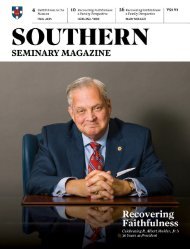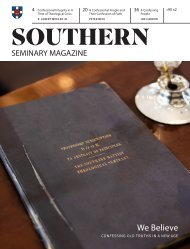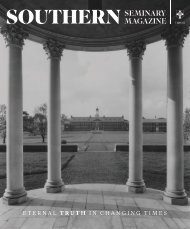Southern Seminary Magazine (Vol 90.1) The Light of Truth: Apologetics in the 21st Century
Create successful ePaper yourself
Turn your PDF publications into a flip-book with our unique Google optimized e-Paper software.
pillars and bridges<br />
criterions that are foundational<br />
to and which ground one’s overall<br />
worldview. Although some<br />
deny that <strong>the</strong>y have a worldview,<br />
this is not <strong>the</strong> case: everyone has<br />
a worldview whe<strong>the</strong>r <strong>the</strong>y acknowledge<br />
it or not.<br />
Despite differences between<br />
worldviews, every view is grounded<br />
<strong>in</strong> some ultimate criterion(s)<br />
or presuppositions that directs<br />
<strong>the</strong>ir reason<strong>in</strong>g and allows <strong>the</strong>m<br />
to <strong>in</strong>terpret <strong>the</strong>ir experience <strong>of</strong><br />
<strong>the</strong> world, especially on ultimate<br />
matters. Given this fact, this is<br />
why what is most significant <strong>in</strong><br />
worldview analysis is compar<strong>in</strong>g<br />
and contrast<strong>in</strong>g a worldview’s<br />
presuppositional commitments.<br />
Fur<strong>the</strong>rmore, it is important to<br />
note that it is not enough merely<br />
to assert one’s presuppositions;<br />
one must also argue for <strong>the</strong>m, at<br />
least if one wants to argue for <strong>the</strong><br />
truth <strong>of</strong> one’s view over aga<strong>in</strong>st o<strong>the</strong>r worldviews. For<br />
this reason, a presuppositional approach to apologetics<br />
does not merely assert <strong>the</strong> truth <strong>of</strong> <strong>the</strong> gospel, it also argues<br />
for <strong>the</strong> objective truth <strong>of</strong> <strong>the</strong> Christian worldview<br />
over aga<strong>in</strong>st non-Christian views.<br />
Additionally, to clarify what presuppositionalism is as<br />
an apologetic method, it is crucial to note that it is not<br />
aga<strong>in</strong>st <strong>the</strong> use <strong>of</strong> evidences <strong>in</strong> <strong>the</strong> defense <strong>of</strong> Christianity.<br />
Unfortunately, <strong>the</strong> term may convey such a misunderstand<strong>in</strong>g,<br />
as if presuppositionalism is only concerned<br />
about argu<strong>in</strong>g for one’s ultimate criterions and not concerned<br />
about giv<strong>in</strong>g specific pro<strong>of</strong>s and evidences for<br />
<strong>the</strong> truth <strong>of</strong> <strong>the</strong> gospel. On <strong>the</strong> contrary, presuppositionalism<br />
affirms <strong>the</strong> necessary role that evidences serve<br />
<strong>in</strong> <strong>the</strong> defense <strong>of</strong> <strong>the</strong> gospel, especially given <strong>the</strong> nature<br />
<strong>of</strong> Christianity.<br />
Unlike o<strong>the</strong>r religious and philosophical views, <strong>the</strong><br />
truthfulness <strong>of</strong> Christianity depends on <strong>the</strong> claim that<br />
our triune God is not only <strong>the</strong> Creator <strong>of</strong> <strong>the</strong> world but<br />
also <strong>the</strong> God who acts <strong>in</strong> history as <strong>the</strong> sovereign and<br />
providential Lord.<br />
Creation and history are <strong>the</strong> stage and <strong>the</strong>ater on which<br />
God displays his glory, and ultimately <strong>in</strong> <strong>the</strong> <strong>in</strong>carnation,<br />
life, death, and resurrection <strong>of</strong> God <strong>the</strong> Son, our Lord Jesus<br />
Christ—<strong>the</strong> one who has assumed our human nature<br />
to accomplish our redemption. For this reason, Christianity<br />
stands or falls on <strong>the</strong> objective truth <strong>of</strong> particular<br />
events <strong>in</strong> history. Thus, for example, if <strong>the</strong> flood, exodus,<br />
“Creation and history are <strong>the</strong><br />
stage and <strong>the</strong>ater on which God<br />
displays his glory, and ultimately<br />
<strong>in</strong> <strong>the</strong> <strong>in</strong>carnation, life, death, and<br />
resurrection <strong>of</strong> God <strong>the</strong> Son, our<br />
Lord Jesus Christ—<strong>the</strong> one who<br />
has assumed our human nature to<br />
accomplish our redemption.”<br />
and Old Testament events did not occur as Scripture describes—or<br />
<strong>in</strong> <strong>the</strong> case <strong>of</strong> our Lord Jesus, <strong>the</strong>re was no<br />
virg<strong>in</strong> conception, miraculous life, bodily resurrection,<br />
glorious ascension, and Pentecost—Christianity crumbles.<br />
If <strong>the</strong>se events did not occur <strong>in</strong> history, <strong>the</strong> truth <strong>of</strong><br />
Scripture and <strong>the</strong> claims <strong>of</strong> <strong>the</strong> gospel are false.<br />
However, presuppositionalism rightly rem<strong>in</strong>ds us that<br />
evidences never stand alone apart from be<strong>in</strong>g presented<br />
<strong>in</strong> an overall <strong>the</strong>ology. Why? Because <strong>the</strong>re are no such<br />
th<strong>in</strong>gs as “brute facts,” namely un-<strong>in</strong>terpreted or self-<strong>in</strong>terpret<strong>in</strong>g<br />
“facts.” Instead, “facts” are part <strong>of</strong> an overall<br />
context—an <strong>in</strong>terpretive system or worldview—by which<br />
<strong>the</strong>y are understood. This is why <strong>in</strong> our presentation <strong>of</strong><br />
<strong>the</strong> “facts” for Christianity, facts must be presented with<strong>in</strong><br />
<strong>the</strong> entire worldview <strong>the</strong>y are embedded, o<strong>the</strong>rwise<br />
<strong>the</strong>y signify noth<strong>in</strong>g.<br />
For example, th<strong>in</strong>k <strong>of</strong> Christ’s bodily resurrection.<br />
Apart from <strong>the</strong> worldview <strong>of</strong> Scripture, <strong>the</strong> resurrection<br />
would not signify what it actually does <strong>in</strong> Scripture. After<br />
all, Jesus’ resurrection is more than a mere historical<br />
event: it is evidence that Jesus alone is <strong>the</strong> Savior, Lord,<br />
Judge, <strong>the</strong> one who has ratified a new covenant, and <strong>in</strong>augurated<br />
a new creation (Acts 2:32-36; 4:12; 13:32-38;<br />
17:30-31; 1 Cor. 15:1-3; Heb. 9:15-28). Apart from a<br />
specific view <strong>of</strong> God, history as <strong>the</strong> unfold<strong>in</strong>g <strong>of</strong> God’s<br />
eternal plan, and a specific conception <strong>of</strong> <strong>the</strong> Redeemer,<br />
Christ’s bodily resurrection <strong>in</strong> history would signify<br />
none <strong>of</strong> <strong>the</strong>se truths.<br />
20 <strong>the</strong> sou<strong>the</strong>rn baptist <strong>the</strong>ological sem<strong>in</strong>ary






